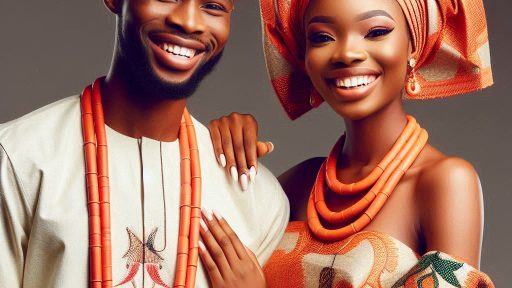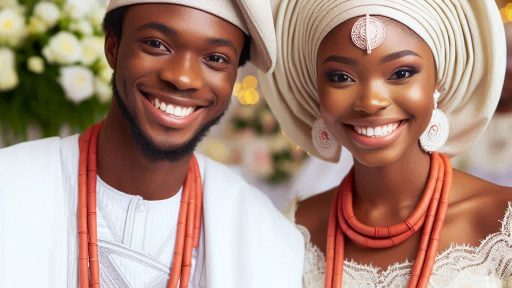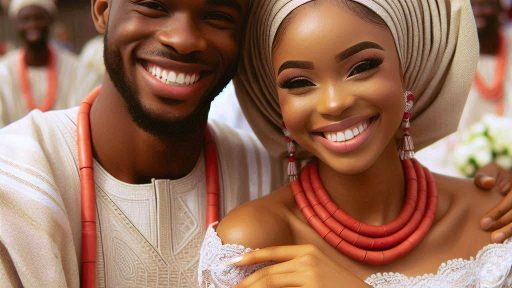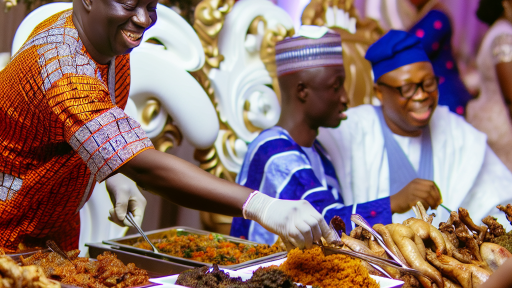Introduction
Traditional wedding rituals in Nigeria showcase the country’s rich cultural diversity.
Each ethnic group presents unique customs and ceremonies.
These rituals are deeply rooted in Nigeria’s heritage and reflect the values and traditions of various communities.
- Diversity of Traditions: Nigeria has over 250 ethnic groups, each with distinct wedding rituals and practices.
- Ceremonial Significance: Traditional weddings hold immense significance, symbolizing the union of families, communities, and cultures.
- Cultural Identity: These ceremonies preserve cultural identity, passing down customs through generations.
- Community Involvement: Traditional weddings often involve the entire community, fostering unity and shared responsibility.
- Symbolic Elements: Rituals typically include symbolic elements like the exchange of gifts, prayers, and blessings.
The importance of traditional weddings in Nigerian culture cannot be overstated.
They represent the merging of families and the continuation of cultural heritage.
By participating in these rituals, families honor their ancestors and celebrate the continuity of their lineage.
Traditional weddings in Nigeria are more than just a union of two individuals; they are a celebration of life, love, and cultural pride
The significance of traditional wedding attire
Traditional wedding attire in Nigeria holds a deep cultural significance, representing the rich heritage and customs of different ethnic groups.
Description of traditional attires for the bride and groom
- Bride: The bride typically wears a brightly colored wrapper or skirt paired with a matching blouse and a gele, which is a head wrap made of colorful fabric.
- Groom: The groom usually wears a traditional agbada or danshiki with intricate embroidery or embellishments, along with a fila or cap.
Local artisans craft the bride and groom’s attire meticulously, showcasing their intricate handiwork and attention to detail.
Symbolism behind the colors and designs used in the attire
- Color: Each color used in traditional Nigerian wedding attire has a specific meaning, symbolizing aspects such as love, fertility, and prosperity.
- Designs: The intricate patterns and designs on the attire often depict traditional motifs that hold cultural significance and tell a story.
For example, the use of gold embellishments may symbolize wealth and status, while geometric designs can represent unity and harmony in marriage.
In fact, traditional wedding attire in Nigeria goes beyond mere fashion statements; it is a reflection of the country’s diverse cultures, beliefs, and values.
Traditional wedding ceremonies in different Nigerian ethnic groups
When it comes to traditional wedding ceremonies in Nigeria, each ethnic group has its unique rituals and customs that make the occasion special and memorable.
Let’s take a closer look at some of the contrasting rituals and traditions across various Nigerian ethnic groups:
Yoruba Traditional Wedding
In Yoruba culture, the traditional wedding ceremony is known as the “Igba Nkwu” or “Igba Iyawo.”
The ceremony involves the groom’s family presenting gifts to the bride’s family, symbolizing the union of two families.
- Yoruba traditional weddings often feature the spraying of money on the bride and groom as a sign of blessings and prosperity.
- A unique feature of a Yoruba traditional wedding is the “Tying of the Knot” ceremony.
In this ceremony, the bride and groom tie their hands together with a piece of cloth, symbolizing their union.
Igbo Traditional Wedding
Among the Igbo people of Nigeria, traditional weddings are elaborate affairs that involve a series of ceremonies and rituals.
One of the most important rituals is the “Igba Nkwu” ceremony, which signifies the formal introduction of the bride to the groom’s family.
- During the Igbo traditional wedding ceremony, the bride is required to seek her groom’s permission before sitting next to him, a sign of respect and submission.
- Another significant aspect of Igbo traditional weddings is the breaking of the kola nut, which symbolizes unity, peace, and hospitality.
Hausa Traditional Wedding
For the Hausa people of Nigeria, traditional weddings are steeped in tradition and cultural practices that have been passed down for generations.
One of the key rituals in a Hausa traditional wedding is the “Kayan Zance” ceremony, where the groom presents gifts to the bride’s family.
- Hausa traditional weddings are known for their colorful and vibrant attires, with the bride and groom wearing elaborate outfits that showcase their cultural heritage.
- Another important aspect of a Hausa traditional wedding is the “Kunya” ceremony.
During this event, the bride receives a new name from her in-laws.
This act symbolizes her new identity and status within the family.
Contrasting Rituals and Traditions Across Various Ethnic Groups
While traditional wedding ceremonies in Nigeria share some commonalities, there are also distinct differences in the rituals and traditions practiced by different ethnic groups.
These variations reflect the diversity and richness of Nigeria’s cultural heritage.
- For example, the Yoruba traditional wedding ceremony focuses on the exchange of gifts between the two families, symbolizing the coming together of two households.
- In contrast, Igbo traditional weddings place a strong emphasis on ancestral worship and the celebration of lineage, with ceremonies that honor the ancestors and seek their blessings for the newlyweds.
- Hausa traditional weddings feature elaborate gift-giving ceremonies and colorful celebrations.
These events showcase the community’s vibrant cultural traditions.
Commonalities and Shared Practices in Traditional Weddings
Despite the varied rituals and traditions, traditional weddings in Nigeria feature common practices shared across different ethnic groups.
These commonalities serve to highlight the universal themes of love, unity, and family that are central to Nigerian culture.
- One common practice in traditional weddings across Nigeria is the presence of elders and respected members of the community who play a key role in blessing the union and offering words of wisdom to the couple.
- Another shared practice is the preparation of traditional foods and drinks to be shared with the guests, symbolizing hospitality and abundance.
- Traditional weddings in Nigeria also often feature music, dance, and cultural performances that celebrate the rich heritage and traditions of the couple’s ethnic group.
Read: Nigerian Traditional Wedding Wishes for the Newlyweds
The role of family and community in traditional weddings
The Role of Family in Traditional Weddings
Family plays a crucial role in traditional Nigerian weddings.
They are involved in every aspect of the wedding process.
From the planning stage to the actual wedding day, family members contribute significantly.
Parents, grandparents, siblings, and extended family all play different roles.
The involvement of family ensures that the couple receives love and support.
Family members help to plan and organize the wedding ceremonies.
They provide financial and emotional support throughout the process.
In Nigerian culture, weddings are seen as a family affair.
Weddings celebrate the unity and bond of the family.
Family members show their approval and blessings for the union.
The couple’s families also come together to form new relationships.
The bride and groom’s families unite to create a larger extended family.
Family traditions and customs are passed down through generations.
The bride and groom honor their families by following these traditions.
Overall, family involvement is key to the success of Nigerian weddings.
The Role of Community in Traditional Weddings
Community support is also essential in traditional Nigerian weddings.
Neighbors, friends, and colleagues all come together to celebrate.
The community plays a crucial role in providing moral support.
Community members offer assistance and contribute to the wedding festivities.
Neighbors help with preparations and decorations for the ceremonies.
Friends and colleagues participate in the wedding rituals and celebrations.
Community members shower the couple with gifts and well-wishes.
The community’s presence adds joy and a sense of belonging to the occasion.
Traditional wedding ceremonies often involve the whole community.
The community’s involvement strengthens relationships and fosters unity.
Guests from near and far travel to attend the wedding ceremonies.
The community shows solidarity and solidarity in celebrating the couple’s union.
Overall, community participation enriches the traditional wedding experience.
Read: Significance of Marriage Registry Over Traditional Weddings
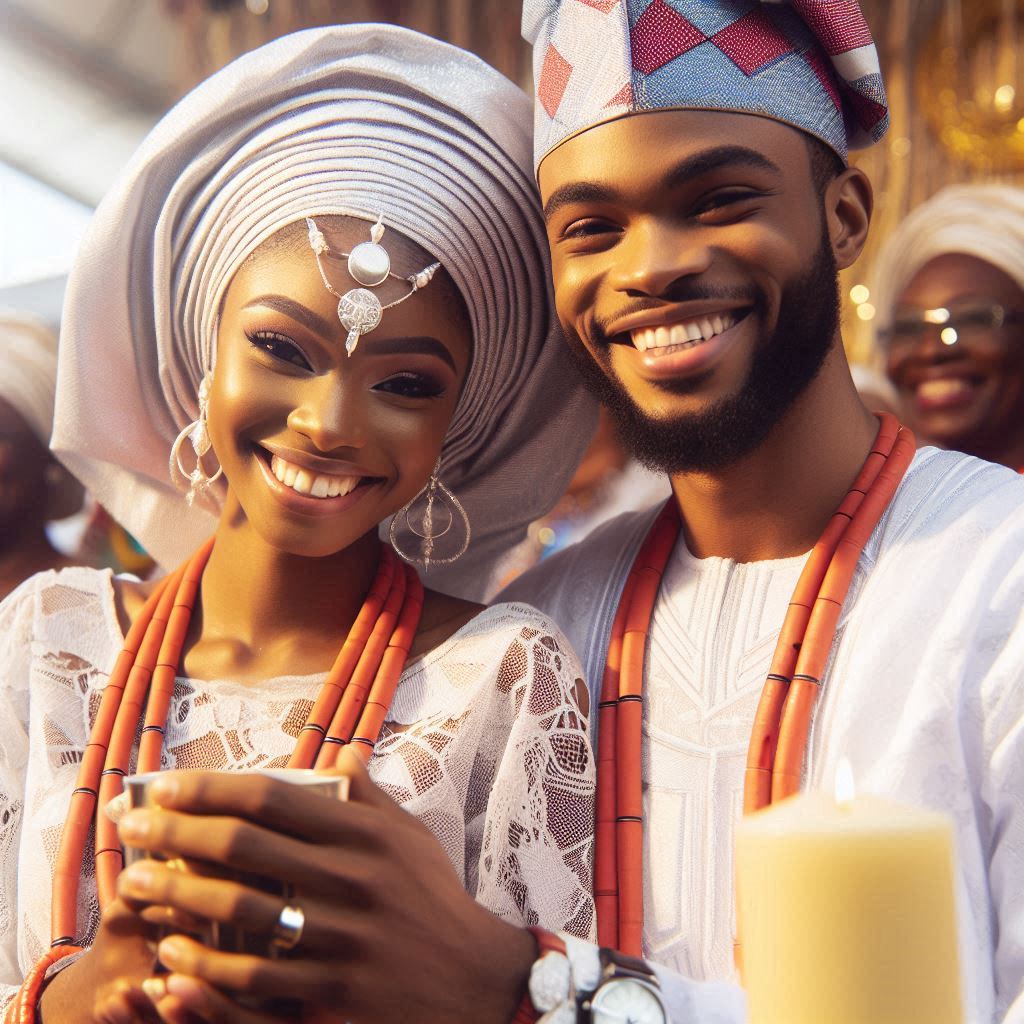
Traditional wedding customs and rituals
One of the most unique aspects of traditional Nigerian weddings is the exchange of gifts between families.
This exchange symbolizes unity and serves as a form of appreciation for the union.
Exchange of gifts between families
During the traditional wedding ceremony, both the bride and groom’s families exchange gifts as a way to solidify the bond between them.
These gifts can range from money to livestock to clothing.
- Money: One of the most common gifts exchanged between families is money.
This monetary gift is usually given to the bride’s family as a show of gratitude for raising their daughter. - Livestock: In some Nigerian cultures, livestock such as cows, goats, and chickens are exchanged between families.
These animals are seen as a form of wealth and symbolize prosperity in the marriage. - Clothing: Traditional Nigerian attire is often exchanged between families during the wedding ceremony.
These colorful and intricately designed garments hold cultural significance and are worn with pride.
Traditional dances, songs, and performances during the wedding ceremony
Another integral part of traditional Nigerian weddings is the inclusion of dances, songs, and performances throughout the ceremony.
These cultural expressions add vibrancy and joy to the celebration.
- Dances: Different Nigerian tribes have their unique dance styles that are performed during weddings.
These dances are accompanied by rhythmic drumming and colorful costumes, creating a lively atmosphere. - Songs: Traditional wedding songs are sung to celebrate the union of the bride and groom.
These songs often have deep meanings and reflect the values and beliefs of the community. - Performances: In addition to dances and songs, traditional performances such as storytelling, poetry recitations, and skits are also common during Nigerian weddings.
These performances entertain guests and add cultural richness to the ceremony.
Overall, traditional Nigerian wedding customs and rituals are deeply rooted in cultural heritage and play a significant role in uniting families and communities.
The exchange of gifts and the inclusion of dances, songs, and performances serve as a testament to the country’s diverse and vibrant traditions.
Read: Yoruba Wedding: A Deep Dive into Traditional Toasts
Challenges and changes in modern traditional weddings
When it comes to modern traditional weddings in Nigeria, there are several challenges and changes that have emerged over the years.
These challenges are mainly influenced by the impact of Western culture on traditional wedding rituals and the need to balance these customs with modern trends in Nigerian weddings.
Influence of Western Culture on Traditional Wedding Rituals
- Western culture has significantly impacted Nigerian traditional wedding rituals.
- Some couples now opt for a fusion of Western and traditional wedding ceremonies.
- Traditional wedding attire has also been influenced by Western fashion trends.
- There is an increasing emphasis on rings exchange as a symbol of marriage.
- Some couples choose to incorporate Western wedding vows into their traditional ceremonies.
Balancing Traditional Customs with Modern Trends in Nigerian Weddings
- Couples are faced with the challenge of preserving their cultural heritage.
- Modern trends such as extravagant decor and elaborate ceremonies are becoming more popular.
- Some traditional wedding practices are being modernized to appeal to younger generations.
- Couples are finding creative ways to blend traditional customs with modern elements.
- There is a growing awareness of the importance of maintaining cultural traditions.
In general, the challenges and changes in modern traditional weddings in Nigeria reflect the evolving nature of wedding customs in the country.
While Western culture has influenced traditional rituals, couples are finding ways to balance these customs with modern trends.
The key is to respect and preserve cultural heritage while adapting to contemporary practices.
Read: Traditional Nigerian Wedding Messages and Meanings
Legal and cultural implications of traditional weddings in Nigeria
Legal Implications of Traditional Weddings in Nigeria
Traditional weddings in Nigeria hold significant legal and cultural implications that shape the societal fabric.
Let’s delve into the legal aspect first.
Recognition of Traditional Marriages in Nigerian Law
- Under Nigerian law, traditional marriages are recognized as valid unions.
However, they must comply with certain requirements to be legally binding. - One key requirement is the need for consent from both parties involved in the marriage agreement.
- Additionally, conduct traditional marriages according to the customs and traditions of the specific ethnic group.
- Registration of the marriage with the appropriate authorities is also crucial to ensure its legal recognition.
Cultural Implications of Traditional Weddings in Nigeria
Traditional wedding rituals in Nigeria play a vital role in preserving cultural identity and heritage.
Let’s explore the cultural significance.
Preservation of Cultural Identity Through Traditional Wedding Practices
- Traditional weddings serve as a platform to showcase and celebrate diverse cultural practices across Nigeria’s numerous ethnic groups.
- These rituals emphasize the importance of tradition, ancestry, and community in shaping individuals’ identities.
- Traditional weddings pass down cultural values, beliefs, and customs from one generation to the next.
- Participating in these ceremonies strengthens social bonds and fosters a sense of belonging within the community.
Conclusion
Exploring Nigeria’s unique traditional wedding rituals highlights the rich cultural heritage of the country.
Each ritual reflects deep-rooted traditions.
These traditions carry profound meanings and strengthen community bonds.
Understanding these practices fosters appreciation for Nigeria’s cultural diversity.
- Cultural Significance: Nigerian wedding rituals offer a glimpse into the values and beliefs of various ethnic groups.
- Unity in Diversity: Each region contributes distinct customs, showcasing the beauty of Nigeria’s multicultural landscape.
- Preserving Heritage: These traditions preserve the cultural identity of Nigerian communities, passing them down through generations.
- Celebration of Love: Nigerian weddings are joyous occasions, celebrating love, family, and community.
Appreciating these traditions enriches our understanding of Nigerian culture.
Recognizing the diversity within these rituals highlights the importance of cultural preservation.
As you explore Nigeria’s unique wedding customs, you witness a vibrant tapestry of traditions.
This journey deepens your connection to the country’s rich heritage and celebrates the beauty of its diverse communities.
Understanding and respecting these customs fosters unity and cultural pride among Nigerians.

